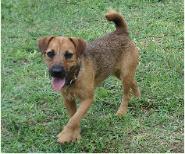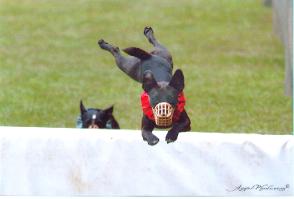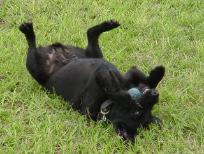| Q. How are they with kids? Our Patterdales have proven to be outgoing and friendly toward children as well as adults. Play between dogs and small children should ALWAYS be supervised, regardless of breed or size, but we have never known any of our Patterdales to be ill tempered toward any people. Q. How are they with other dogs? Most Patterdales are not dog aggressive by nature. Our own are socialized at an early age, with other dogs and with people. We have a number of dogs, both Patterdales and Fila Brasileiros, who all run together on our five acres. With an occasional exception, they get along very well with others. We are especially careful to monitor everyone's behavior, especially during heat cycles. Again, I must emphasize the importance of socialization and basic obedience training, as with any breed. Q. Are they difficult to house train? I was surprised to learn, years ago, just how difficult training a small dog is, as compared to a larger one. The fact is, they simply need to eliminate more often than a big dog. I remember the Filas basically training themselves! The Patterdale has been more of a challenge, but is certainly easier than the average small breed. Crate training is an absolute must, in my opinion, to have a reliably house-trained Patterdale. Q. I don't go hunting. Will my Patterdale be happy? As long as you provide an outlet for that great terrier energy, your Patterdale will be a happy companion. There are many activities that can provide the exercise and stimulation your terrier needs to be happy and obedient. For example, check out some terrier events in your area, or maybe the local flyball club. We attend terrier trials in our area - loads of fun for all! Try www.workingterrier.com for helpful information and links. Q. What's the difference between a Patterdale Terrier and a Fell Terrier? The Patterdale developed as a type of Fell terrier. Q. Do they shed much? No. Very little. Q. Do they need a lot of exercise? Yes! As terriers, they have an above average need for activity! Physical AND mental stimulation are vital to a Patterdale Terrier's well being. Q. How big is a Patterdale? How much does it weigh? What colors are they? They are 11 to 15 inches tall (measured at the withers) and range from 10 to 17 pounds. The ideal height is that which is suited to the game you hunt. Acceptable colors include Black, red, liver (with a red nose), grizzle, black and tan, and bronze (chocolate). See the breed standard for "specifications"! Q. Is the Patterdale Terrier AKC or FCI recognized? The Patterdale Terrier is NOT recognized by AKC or FCI. Q. How do I register my Patterdale? When you buy a Patterdale Terrier, the seller should provide a pedigree (family tree), signed by the dog's breeder. A copy of the pedigree is submitted to the registry you would like to register your Patterdale with. Currently, the Patterdale Terrier is recognized by the PTCA (Patterdale Terrier Club of America). This organization registers only Patterdale Terriers. There are many all breed registries that accept the Patterdale Terrier as well. These include the UKC (United Kennel Club), ARBA (American Rare Breed Association, Inc.), CKC (Canine Kennel Club) and numerous others. At Lost Lake Farm, all of our Patterdale Terriers are registered with the PTCA and UKC, and some are registered with other organizations as well. The PTCA uses a single registration procedure, whereas the puppy's new owner will send an application for registration along with pedigree and photographs. The UKC uses a litter registration procedure. When a litter is whelped from registered parents, the breeder registers the litter. The UKC sends a registration paper and number for each puppy in the litter. That "puppy paper" is given to the new puppy owners who send it to UKC along with their fee for permanent registration. UKC sends the new owners a permanent registration in their name. |
| Frequently Asked Questions (or...is the Patterdale the dog for me?) |






| LOST LAKE FARM Patterdale Terriers |



